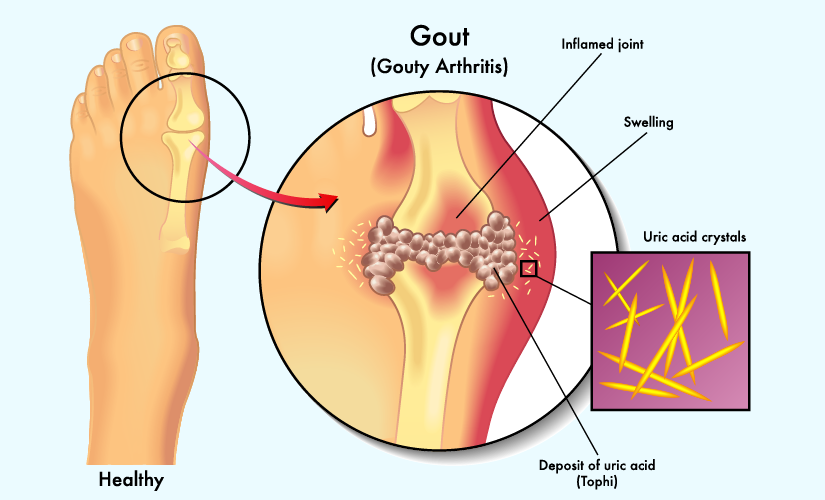Unmasking the Mystery: Understanding High Uric Acid
High uric acid, a metabolic byproduct of purine breakdown in the body, can pose significant health challenges if it accumulates beyond a healthy threshold. This condition, known as hyperuricemia, requires careful attention and proactive management to prevent complications like gout, kidney stones, and other chronic ailments. As a senior medical consultant specializing in metabolic disorders, I aim to provide a comprehensive understanding of high uric acid, its symptoms, causes, and evidence-based strategies for effective control.
Symptoms: A Spectrum of Discomfort and Dysfunction:
Elevated uric acid often manifests in a constellation of symptoms that may vary in severity and presentation. Here’s a closer look at some of the common culprits:
- Arthritic flares: Uric acid crystals can accumulate in joints, triggering painful inflammation, redness, swelling, and stiffness. This typically affects the smaller joints in the feet, ankles, knees, and hands, leading to gout attacks that significantly impact mobility and quality of life.
- Fatigue and malaise: Persistent tiredness is a frequent symptom, often attributed to the inflammatory burden associated with high uric acid. This can affect daily energy levels, motivation, and overall well-being.
- Urinary tract woes: Increased uric acid can irritate the lining of the urinary tract, leading to burning sensations, frequent urination, urgency, and even blood in the urine. Urinary tract infections (UTIs) become more common in individuals with hyperuricemia due to this altered environment.
- Kidney stones: Uric acid crystals can also agglomerate in the kidneys, forming painful stones that obstruct the flow of urine. Symptoms like nausea, vomiting, intense back pain, and difficulty urinating may indicate this potentially serious complication.
Causes: A Multifaceted Puzzle:
The precise triggers for high uric acid levels are complex and often involve a combination of factors:
- Genetic predisposition: Some individuals inherit a genetic tendency to produce more uric acid or have impaired kidney function, making them more susceptible to hyperuricemia.
- Dietary choices: Purine-rich foods like organ meats, red meat, certain seafood, and sugary beverages can significantly elevate uric acid levels. Alcohol, particularly beer and distilled liquors, also contribute to the problem by inhibiting uric acid excretion.
- Medical conditions: Diseases like obesity, diabetes, high blood pressure, and chronic kidney disease can alter uric acid metabolism and excretion, leading to elevated levels.
- Medications: Certain diuretics, aspirin, and immunosuppressants can also interfere with uric acid clearance, potentially contributing to hyperuricemia.
Prevention and Management: The Power of Lifestyle Choices:
Fortunately, proactive lifestyle modifications can play a critical role in controlling uric acid levels and mitigating related health risks. Here are some key strategies:
- Dietary adjustments: Prioritize a low-purine diet rich in fruits, vegetables, whole grains, and legumes like lentils and chickpeas. Limit red meat, organ meats, and seafood, and opt for skinless, lean cuts when consuming them. Choose low-fat dairy products and healthy fats like olive oil or avocado.
- Weight management: Maintaining a healthy weight is crucial, as obesity can significantly impact uric acid metabolism. Aim for gradual weight loss through healthy eating and regular physical activity.
- Hydration: Drinking sufficient water throughout the day helps dilute uric acid levels and promotes healthy kidney function. Aim for at least 8-10 glasses of water daily.
- Sugar control: Limiting added sugars in your diet, including sugary drinks and processed foods, can help manage blood sugar levels and indirectly impact uric acid production. Opt for natural sweeteners like fruits and honey in moderation.
- Exercise: Regular physical activity, even moderate-intensity cardio and strength training, can improve overall health, reduce inflammation, and support healthy uric acid levels.
- Stress management: Chronic stress can exacerbate inflammation and contribute to high uric acid levels. Practice relaxation techniques like yoga, meditation, or deep breathing to manage stress levels effectively.
Medical Intervention: When Necessary:
In some cases, lifestyle modifications alone may not be sufficient to control uric acid levels effectively. Your doctor may recommend medications like xanthine oxidase inhibitors (allopurinol, febuxostat) or uricosuric agents (probenecid) to help lower uric acid production or increase its excretion. Depending on the severity of symptoms and risk factors, other treatment options may be considered.
Bottemline: High uric acid is not a mere metabolic blip; it demands attention and proactive management. By understanding its symptoms, causes, and effective management strategies, individuals can empower themselves to take control of their health and minimize the risk of associated complications. Remember, a holistic approach that combines dietary adjustments, weight management, exercise, and stress management is key to successfully navigating the complexities of high uric acid and achieving long-term well-being.
#KickUricAcidToTheCurb, #NoMoreGoutFlares, #ProtectYourKidneys, #HydrateForHealth, #MoveYourBodyFeelBetter, #EatSmartStayStrong, #StressManagementMatters, #EmpowerYourHealth, #TogetherWeThrive, #PersonalizedMedicine, #HealthAdvocacy, #ShareYourStory, #SupportTheCause, #PreventativeCare, #ScienceOfHealth






